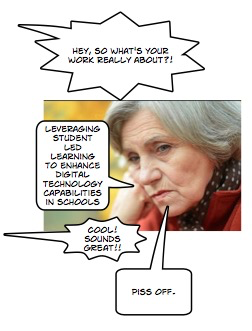manifesting roads

This is the manifesto that's just been released by the ITP - boldly titled: New Zealand's Digital Future
The word origin for manifesto is “manifest” - from the Italian. The definition of ‘manifest’ is:
readily perceived by the eye or the understanding; evident; obvious; apparent; plain
After reading through the first few pages of this manifesto, it’s apparent to my educationally orientated eyes at least - that the intentions and opinions of this manifesto are well adrift of any meaningful educational purpose or use.
The first page begins with this noble goal:

This is at best pablum with no quantifiable or maintainable aims, and at worst, a damaging call to redefine and remeasure public education in this country. Both of these options are carefully couched in the untouchable fuzziness of being “for the kids” - that no fair minded person would dare challenge.
So as someone who’s worked in education for the last 12 years, allow me to challenge the three core parts of the “Future of our People” section found in this manifesto
The Posit:
"True transformational change is required in what and how we teach our kids about technology. The pace of this change must also be significantly accelerated.”
This broad statement in the first paragraph, appears to want to trigger the Singularity.
The challenge they lay down to education is to be transformational - without really defining what that means.
The current government has invested hugely in network infrastructure computer hardware, a number of entirely new schools as well as rebuilds of existing sites.
Schools and communities have outlayed large amounts of cash in new devices for students, as well as software licenses for those devices. Every big box retailer across the country is keen to sell to schools, especially with the rise of the now ubiquitous BYOD policies in play across many schools. The Ministry of Education has a comprehensive agreement with Microsoft - and Google and Apple have strong footholds in every primary and secondary school in the country.
Is not all of this arguably "transformational"?
This mix of educational transformation is complex and messy and unevenly distributed. It reflects not only the current state of technology, and the people we have to effectively implement it, but also our invisible biases as to what good schools should look like right now and into the near future.
The pace of change throughout this transformation - on educators and on parents has been nothing if not accelerated.
You could measure that in the amount being spent on professional development, for teachers, or by the hours spent on learning how to use any multitude of systems that are meant to make things “better”. Parents are asked to log in to a multitude of sites, to unpack learning, to share learning, to see in real-time what we’re doing inside our educational centres.
And the question I ask is - is it any better?
Do our educators feel more confident?
Do students feel more cared for or understood?
Are parents any closer to really understanding what it is their children are doing or learning when they come to school?
Do our communities have any better understandings of what it is we educators talk about - such that they feel they can trust us?
Is our understanding of the purpose of education and learning any more advanced or nuanced than say it was in 2000?
Or 1989?
Because if it’s not, then has all this “transformation” and expense been for naught? If we accelerate this change any more, will we do so while paying any attention to what’s being left behind.
Wouldn’t the only people that really, truly benefit from the rush to be transformational and significantly accelerated - be those who are self-promoting “transformation” and “acceleration” - not the ones who deal with the consequences and debris left behind.
The role of governments
The manifesto calls on the government to
Embrace the urgent need for true transformational change through the introduction and integration of Digital Technologies throughout the education system
The section is possibly the worst pile up of pablum I’ve had the privilege of reading in a long time, and the peculiarity is best summed up in this quote:
Government will...
Investigate the international use of alternate teaching methods such as leveraging student led learning to further enhance Digital Technology capabilities in schools.
This apparently is a thing.
I'm not even sure what the thing is, but a good friend mocked this up - and arguably it's every educator in the country.

None of these ideas make any sense or could be constructed into anything useful from a practical school or classroom point of view. Mainly because they are already givens in the education sector.
Do we need more money to upskill teachers? Yes.
Do we need to upskill teachers in “Digital Technologies”? Yes.
Do we need to upskill teachers in Literacy and Numeracy? Yes.
You could of course wrap any or all of our current curriculum areas into some sort of “digital technology” derived context, or deliver that content over a digital network using digital devices.
And we might attempt to do so, but probably in the most easy and most measurable of ways. - because you’ve asked for the government to..
“Require every school to teach, and report on, the Digital Technologies curricula up to Year 10”
This will of course get turned into a test-driven content focused curriculum - because it’s easier that way.
Will that test look like the Google, the FOSS, the Microsoft or the Apple way?
Or will it look like this contrived ICAS Digital Technologies test
The role of industry
Encourage local professionals and firms to engage with local schools and teachers as their teaching and learning evolves.
After an emphatic demand for the government and schools to “DO MORE, REQUIRE MORE, DELIVER MORE” the final section is rather weak sauce. It can be summed up by the IT professionals saying “We’ll be around if you need us - you know, encouraging you."
There's one reason people go to work in tech firms - it’s in the ITP manifesto - because the
“tech sector … is frequently found to be amongst the highest paid professions and has the potential to redefine the economic development of New Zealand.”
Promoting and ‘encouraging’ from the sidelines makes for a wonderful warm fuzzy for the tech sector, like they are "giving back" to the children - but while that's great and all - the public education sector in New Zealand has an annual budget of $14.4 billion dollars.
It’s a serious business.
And the tech sector knows this.
Schools aren’t charities, and they shouldn’t act as charities. But they also aren’t startups. Nor are they needing to change or save the world, like many in Silicon Valley and their ilk believe is their privilege.
The tech sector is aware of the wonderfully captive market that the education sector is - for their products, for their services, for their software and hardware.
Education on the whole has lapped those services and products up. Remember interactive whiteboards, 3D printers and Google cardboard VR sets?
The tech sector is also aware of the fact that schools in part, serve to produce competent workers that can fill the roles that the thriving tech sector needs and demands.
That’s fine also - and a perfectly valid role for public education to fill.
But let’s not insult each other by assuming the tech industry is mildly cheering from the sidelines of public education, for the perceived greater good of the fine citizens of New Zealand, while demanding that education shift itself to be something that serves the tech sector.
The tech sector is utterly invested in getting what’s best for itself and its shareholders..
To me it is manifestly evident, that what this document lays out is an ability to disengage from what we must strive to constantly do and be in education.
Namely - human and caring.
This manifesto removes any shred of humanity or care or concern for what it is to be an actual living human.
It talks of students and results and outcomes in such horribly abstract ways that it strips the very essence and soul out of our role as educators.
It knows nothing of humans who can’t for the life of themselves figure out why no-one likes them.
Humans who are angry and want to be liked, and for whom the digital space is just another way by which they’re excluded or made to feel small.
It knows nothing of humans who are dealing with so much other real life, off-line broken-ness, that a constant scroll through Instagram, Snapchat or Facebook is the only connection they have with any positive emotion.
It knows nothing of the realities that reading, writing, numeracy, art, dance and science bring to a child. Of course, all of these can be delivered via a small glass screen, an SSID and a series of interconnected IP addresses, but none of these subjects matter if the person viewing the screen doesn't care.
Education matters. Learning matters.
But only if we care enough as humans to be the connection.
When we as school leaders, as Ministry analysts, and as politicians abdicate our responsibility to be in control of the conversations and the contexts, within which education and learning occurs - we fail.
We fail ourselves in the roles we hold, we fail the very students we work for and with, and more importantly we fail the future.
This manifesto seeks to
“make a meaningful contribution to the agendas of political parties”
Let’s call it out for what it manifestly is - an agenda for a sector that seeks to serve its own - in ways that will, without a cautionary, reflective approach - cause irreparable damage to the nature, purpose and place of public education in the service of a shared public good.
If I’m wrong in how I read this document, I say this to the signatories of this manifesto - "Let us talk."
In 2500 schools right across Aotearoa there are people that really care about the future of this place.
Every day we seek to make the lives of our young people better.
Come check out our places, come see our struggles, and our successes.
Come see the ways in which we're connecting, in digital and analog ways.
Come see how long it takes to shift the culture and practises of a successful school.
Come see what matters to students.
Let’s talk away from the halls of government policy and Ministry task forces.
Let's talk away from the half dozen super-star schools that you've all already visited.
How about we be honest and transparent about what is and is not happening in schools and in our communities. Most importantly, lets unpack what actually underpins those failings and fosters those successes.
Sometimes the things that are manifest to each of us in our sectors - aren’t obvious until we start talking to each other.
So lets do that - lets talk.

